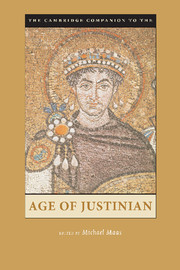Book contents
- Frontmatter
- Part 1 Structures and Ideologies of Empire
- Part 2 Religion and Philosophy
- 9 The Legacy of Chalcedon
- 10 Society and Community in the Christian East
- 11 Emperors and Popes in the Sixth Century
- 12 Christian Piety and Practice in the Sixth Century
- 13 Philosophy in the Age of Justinian
- Part 3 Literature and the Arts
- Part 4 Peoples and Communities
- Bibliography
- Index
- Plate Section 1
- Plate Section 2
13 - Philosophy in the Age of Justinian
from Part 2 - Religion and Philosophy
Published online by Cambridge University Press: 28 May 2006
- Frontmatter
- Part 1 Structures and Ideologies of Empire
- Part 2 Religion and Philosophy
- 9 The Legacy of Chalcedon
- 10 Society and Community in the Christian East
- 11 Emperors and Popes in the Sixth Century
- 12 Christian Piety and Practice in the Sixth Century
- 13 Philosophy in the Age of Justinian
- Part 3 Literature and the Arts
- Part 4 Peoples and Communities
- Bibliography
- Index
- Plate Section 1
- Plate Section 2
Summary
No one reading the last chapters of Eduard Zeller’s monumental Philosophie der Griechen, first published between 1844 and 1852, will fail to notice the barely veiled contempt that pervades his account of the final period of ancient Greek philosophy. Summarily treating the fifth and sixth centuries, he concludes that around this time Greek philosophy collapses not on account of external circumstances, but due to internal exhaustion. Zeller’s almost wholesale condemnation of the period no longer stands, yet it would be foolish wholly to disagree with him. The sixth century is a period in which the philosophical glory that was Greece is wearing thin; philosophers, and especially pagan ones, are rare birds indeed, flocking together for shelter and survival in various parts of the empire. What they have to say is, in a sense, derivative and remains largely unintelligible today unless it is understood against the backdrop of the great philosophical past.
Judged from a different perspective, however, Zeller’s view becomes problematic. One only has to take note of the sheer quantity of philosophical writing produced in this late period: it is staggering, and this is particularly true of the time of Justinian. To give but one example: of the roughly sixty different works printed in the Berlin edition of the Greek commentaries on Aristotle (CAG), some twenty belong to the decades discussed in this volume. These also happen to be some of the most substantial and valuable works in the series, rivaling the great commentaries of a luminary such as Alexander of Aphrodisias of the second and third centuries CE. To this output we may add a considerable number of commentaries on Plato as well as other works of different genres, only some of which have survived.
- Type
- Chapter
- Information
- The Cambridge Companion to the Age of Justinian , pp. 316 - 340Publisher: Cambridge University PressPrint publication year: 2005
- 7
- Cited by

